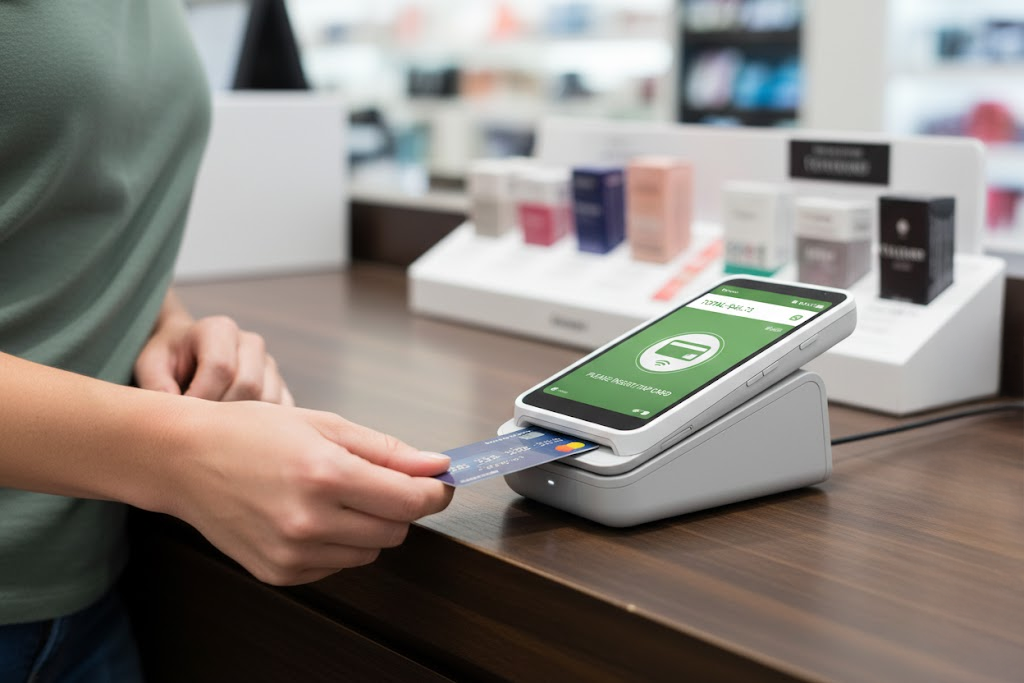
Dojo Card Machine: Independent UK Guide for Businesses
What Is a Dojo Card Machine? A Dojo card machine is a payment terminal supplied as
Get a quote in seconds with our simple form
Last updated 21/01/2026
We’re the experts when it comes to taking card payments, so we understand that the names for things can get confusing. From merchant accounts, payment gateways, and acquiring banks, to payment aggregators, credit card processors, and PDQ machines, it can all become very confusing very quickly.
With all of these terms flying around, it would be helpful if there were one single name that referred to the companies that provide businesses with all of these services. Luckily, there is.
They’re called payment processors.
A payment processor is a company that handles digital payments on behalf of your business. They deal with the whole thing, from taking payments with a card machine or online payment gateway, through to communicating with banks and authorising the transfer of funds.
You might have heard of payment processors referred to as a part of the transaction process, but more recently, it’s a term used to describe the companies that allow the whole payment process to progress through each necessary step.
Payment processors handle the transfer of funds between the customer’s bank and your merchant account, and then to your business bank account. The range of payment methods your payment processor will cater for depends on where it specialises.
Some processors only deal with online payments, while others allow for a wide variety of payment methods from PDQ machines to fully-integrated EPOS systems.
Payment gateways and payment processors can often get confused with one another, largely due to their similar names. They are, however, different things with different roles.
Payment processors allow you to accept various payment methods, including credit cards, debit cards, mobile payments, and online payments. Payment processors can provide every component required for taking payments; one of these components is a payment gateway.
The role of a payment gateway is to collect the information needed from a customer’s bank to allow a payment to happen. Once they have collected this information, they open the door for the payment processor to step in and complete the payment.
As you’ve just read, card payments require several checks to be carried out to make sure they can go ahead. One of those checks is done by a payment gateway, which essentially makes sure your customer has enough money to pay for you.
As part of these checks, the money from your customer is moved into a merchant account, which is a type of bank account where the money is held while these checks are carried out. Once it’s all gone through, your takings are moved from your merchant account to your business bank account by your payment processor.
Please select the industry that you trade within. This information allows us to tailor your quote.
If you’re confused about all the jargon you’ve just read, don’t worry. While this article focuses on the best payment processors for your business, we also have in-depth guides that explain all you need to know about taking card payments.
Choosing the right payment processor can be tricky, especially if you’re new to electronic payments. That’s why we’ve done the research for you.
This article compares what we consider to be the top five payment processors for your business. We’ll cover processing fees, user-friendliness, and integration options to help you make an informed decision. Click on the provider below to learn more:
Square is one of the big payment processors in the UK. Its services are well-suited to small businesses, and it has become a big player in that area in recent years. One of the things that makes it attractive is its fast payouts and lack of contract.
With Square, you can accept payments in-person and online, build an e-commerce shop, and use its POS app—all for no monthly fee. You’ll only pay a standard transaction fee of 1.75%.
Square offers a variety of hardware options for accepting payments. Whether you need a card reader or a more comprehensive POS system, they have a solution.
Unlike some providers, Square charges a one-time fee for its hardware, eliminating the need for ongoing rental fees. However, Square does charge transaction fees on all payments processed through its platform, which are listed below:
This pricing structure applies to in-person payments and online checkouts.
Stripe is probably the most versatile payment gateway provider on this list. With its various integrations, range of card machines, multiple ways of accepting payments, and ability to slot right into your existing systems, it’s a strong contender for your business. What’s more, its lack of monthly fees boosts its affordability for smaller businesses.
Its choice of six card machines and mobile apps means that whether your business needs a small portable card reader, a mobile app, or a large machine to pair with an EPOS system, Stripe is well-placed to suit your requirements.
Stripe charges different transaction fees depending on how the payment is made and where it happens. For businesses that operate solely in the UK, there’s a 1.4% + 10p charge for in-person payments and 1.5% + 20p charge for online payments.
You do pay a higher rate on certain card payments, like those made with commercial, corporate or business cards. For these kinds of payments, you pay a 1.9% + 20p.
The payment gateway takepayments provides is a hosted payment gateway, so you don’t have to have the gateway on your site, and the complicated stuff is handled externally. This makes it easy, safe, and secure for your business, so you don’t have to deal with any of the nitty-gritty hassle. You can, however, fine-tune the payment experience to suit your business’s brand so you still retain control.
Payment gateways are only part of what takepayments provides, so, like Stripe, it’s also great for businesses that want to take payments in multiple ways. It offers virtual terminals, QR code payments, and pay-by-links, and you can track all of this with the takepayments app.
While the company does outline the types of fees it charges on its website, which include transaction fees, rental fees, and minimum monthly service charges, it only offers tailored pricing plans. To get a precise quote, you’ll need to share specific details about your business and payment requirements with the company directly, which you can do on its website.
While this might take a little extra time, it does guarantee you’ll only pay for the services you truly need.
As a leading choice for businesses globally, Worldpay offers a variety of payment solutions, from card machines and EPOS systems to payment gateways.
One of Worldpay’s most valuable features is the dashboard, which provides a centralised platform for managing your account. It allows you to track transactions, settlements, and invoicing so you can have a real insight into your business’s payment activity.
Worldpay’s SaferPayments program is a bonus, ensuring compliance with PCI standards and offering robust fraud prevention measures. This, combined with their expert guidance, makes them a trusted partner for all your payment needs.
Worldpay’s fees come from several sources. Unlike some providers on this list, Worldpay doesn’t offer the option to purchase a card machine outright and instead charges a rental fee.
Worldpay charges a 1.5% transaction fee if you go for its simplicity pricing tariff and 0.75% + 4.5p if you go with its custom pricing tariff. However, you will have to be taking at least £75,000 in card payments annually to access the lower rate.
With its payment gateway fees, there is a monthly fee of £19.95. This, along with the 1.5% transaction fee, is the only cost you need to account for. There are no upfront fees, authorisation fees, or premium charges, which helps if your business is keen on not overspending on its payments. As a bonus, payments are typically processed within the next business day, which also comes with no extra cost.
Zettle is part of PayPal, which is a long-time player in the taking payments game. Zettle is well known for its user-friendly interface and competitive pricing, making it a popular choice for small and medium-sized businesses. With Zettle, PayPal is the company that provides you with the account you use to hold your funds, and it’s also PayPal that processes your payment. Like takepayments, they provide you with a hosted payment gateway, so it deals with the actual taking of payment, making it less hassle for you.
For this reason, it’s well-suited to smaller businesses. Its lack of contract boosts its attractiveness, as do its competitively priced card machines and EPOS systems, which can cover the needs of small and growing businesses. Its main strength, however, is its simplicity; all you need is the Zettle app for both in-person and online payments. You don’t even need a card machine.
Zettle offers affordable card machines. The basic Zettle Reader is available for a one-time payment of £29, while the more advanced model is £149. If you don’t need a dedicated card machine, you can use the free Zettle app on your mobile device.
Zettle’s EPOS systems are also reasonably priced. The Zettle Store Kit starts at £169, making it a cost-effective option for businesses looking to upgrade their point-of-sale capabilities.
Zettle’s transaction fees are not as competitively priced as its hardware. Each payment incurs a 1.75% fee, regardless of the device you use, and payment links and invoices are subject to a 2.5% fee. Therefore, the lack of card rental fees and free membership might not result in significant cost savings.
When it comes to choosing your payment gateway, it will ultimately depend on your business’s specific needs. You will need to ask yourself how many card payments you expect to take, whether you’ll need a card machine as well as an online payment gateway, and if you prefer not to be tied down to a contract or rental fees. You know your business better than anyone, so you know what’s best.
That said, of the providers on the list above, Worldpay is most likely to suit you best if you have a larger business that takes lots of payments, takepayments is best for medium-sized businesses, and SumUp is best for small businesses. These generalisations aren’t definitive, but they’re good for a general idea of what might suit your business.
A payment gateway allows businesses to accept, process, and manage customer payments. They allow you to accept various payment methods, including credit cards, debit cards, and mobile payments.
When it comes to choosing your payment gateway, you know your business better than anyone.
You will need to ask yourself how many card payments you expect to take, whether you’ll need a card machine as well as an online payment gateway, and if you prefer to not be tied down to a contract.

What Is a Dojo Card Machine? A Dojo card machine is a payment terminal supplied as

What Are Stripe Payments? Stripe Payments is a payment processing service provided by Stripe that allows

Your business needs a card machine that’s suited to you and your customers: here’s our breakdown




CommercialExperts.com helps savvy UK businesses to save time and money by comparing a wide range of essential products and services.
© TFLI 2025 All rights reserved. Licenced by the Information Commissioners Office, (Registration Number Z3585914) Registered in the UK, number 08424810. Registered Office Address: First Floor, Beechwood Court, Springwood Way, Tytherington Business Park, Macclesfield, Cheshire. SK10 2XG.